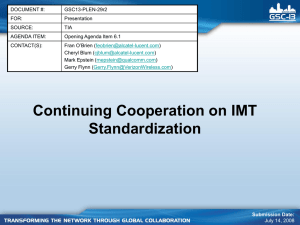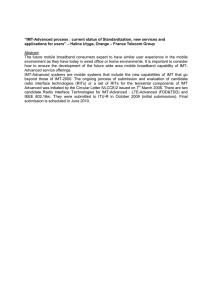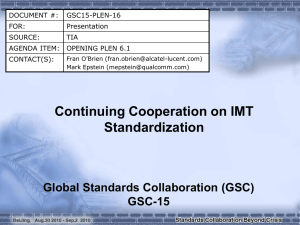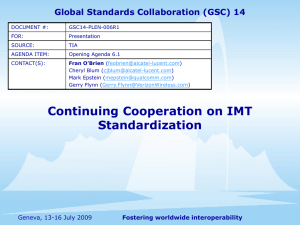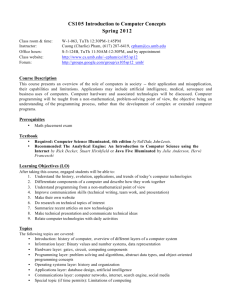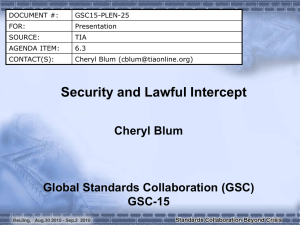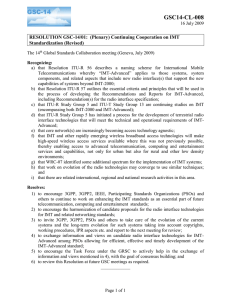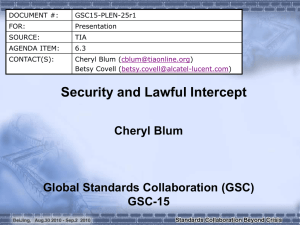DOCUMENT #: GSC13-PLEN-29r1 FOR: Presentation
advertisement
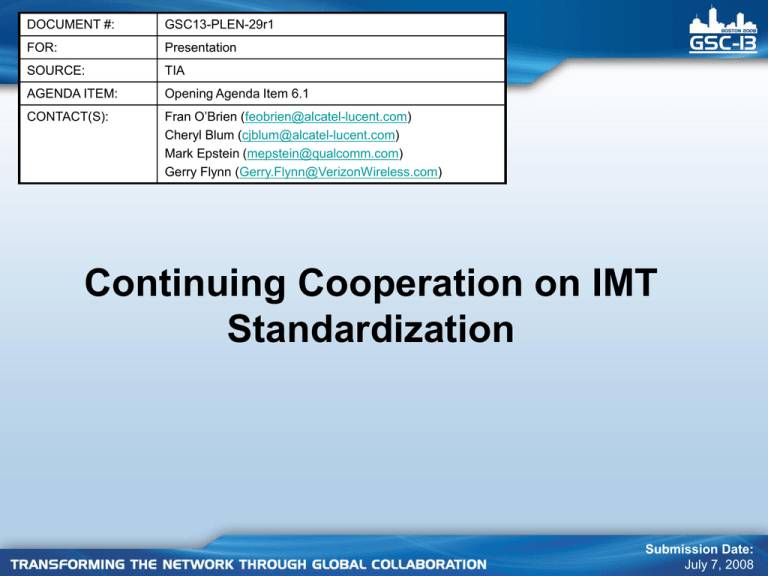
DOCUMENT #: GSC13-PLEN-29r1 FOR: Presentation SOURCE: TIA AGENDA ITEM: Opening Agenda Item 6.1 CONTACT(S): Fran O’Brien (feobrien@alcatel-lucent.com) Cheryl Blum (cjblum@alcatel-lucent.com) Mark Epstein (mepstein@qualcomm.com) Gerry Flynn (Gerry.Flynn@VerizonWireless.com) Continuing Cooperation on IMT Standardization Submission Date: July 7, 2008 Highlight of Current Activities (1) • TIA continues to actively support the ITU IMT Standardization Activities – Subcommittee TR-45.5 develops performance, compatibility and interoperability standards for Spread Spectrum Digital wireless access systems supporting international, public, non-public, or residential mobile and personal communications. – These standards apply to service definition, mobile and portable station equipment, base station equipment, ancillary apparatus, as covered by applicable Parts of the FCC Rules. – Subcommittee TR-45.3 continues to work jointly with WTSC RAN to provide joint submissions for TDMA-SC. 2 Highlight of Current Activities (2) • Recently Completed TR-45.5 Work Items – HRPD Rev. B Addendum – UMB (Ultra Mobile Broadband) – HRPD Rev. B Performance Standards – VoIP Codecs and Protocols – EVRC Rev. B MPS and software distribution – EVRC Rev. C MPS and software distribution – Packet Switched Video Telephony – IMT.TECH input – IMT.EVAL input • Select current activities – – – – – – – – – – – Highly Detectable Pilot Interworking HRPD Enhancements 1x Enhancements UMB Addendum UMB TDD EUIMID related addenda Band Class CMAS Position Determination Enhancements Multimode System Selection – Enhanced System Selection for femto cells 3 Highlight of Current Activities (3) • Select current activities – HRPD Performance and Conformance – UMB Performance and Conformance – BCMCS codecs and transport protocols – MMD and PoC codecs and transport protocols – Smart card enhancements • Multimode system support • CSIM/CCAT alignment • UICC enhancements for high speed interface • Femto cell security and selection support 4 Strategic Direction • TR-45.5 will: – Maintain and enhance the core specifications (cdma2000® 1x, HRPD, and UMB) – Develop new technologies and services – Partner with 3GPP2 and its Organizational Partners and Marketing Representation Partners – Collaborate with other standards groups, e.g., 3GPP and WiMAX Forum on interworking – Work with ITU • Provide ITU with updates of cdma2000 ® as IMT-2000 and Broadband Wireless Access (BWA) • Provide ITU with input on the IMT-Advanced – Concentrate on environmentally friendly systems and services: Green Initiatives 5 Challenges • Increase capacity while maintaining service quality and system coverage to satisfy the market demands • Enhance data throughput and reduce latency to accommodate the existing and emerging data services • Continue to meet the time to market requirements by the industry 6 Next Steps/Actions • TR-45.5 – Continue to develop new technologies and services for the cdma2000® industry – Innovate and improve existing systems in TR-45.5 – Work closely with regulatory bodies to provide solutions for location services, emergency notification, new frequency plans and other governmental services. • TR-45.3 – Continue to work jointly with WTSC RAN to provide joint submissions for TDMA-SC. 7 Supplemental Slides 8 IMT-Advanced • Developed comments on the IMT-Advanced requirement (IMT.TECH) document • Developed comments on the IMT-Advanced Evaluation Methodology (IMT.EVAL) • Currently evaluating, assessing and consolidating technology proposals • Develop Radio Interface Technology submittal for IMT-Advanced 9 Emergency Services • Commercial Mobile Alert System: – TR-45.5 and ATIS have been jointly developing the CMAS-related specifications common for the two groups – TR-45.5 has been working on cdma2000®-specific CMAS-related specifications – Drafts of these specification are stable and TR-45.5 is on track to complete the publication in October 2008. 10 E911 and Priority Services • Support of granting priority access to cdma2000® services to a government-related special class of users. • Support identification of emergency calls originated by the mobile station. This indication is passed to the network. 11 Location • Protocols and procedures to enable mobile station assisted advanced forward link trilateration (AFLT) for HRPD access networks including Highly Detectable Pilot and UMB access networks • Protocols and procedures to enable mobile station based AFLT for 1x, HRPD, and UMB networks • Protocols and procedures to enable additional Global Navigation Satellite Systems, e.g., Galileo 12 Band Class Enhancements • Addition of band class support for the air-to-ground (airborne terminal and ground base stations) system operations • Revised the 700 MHz band plan in response to band modifications defined by the FCC • UMB system support in the band class specifications 13
